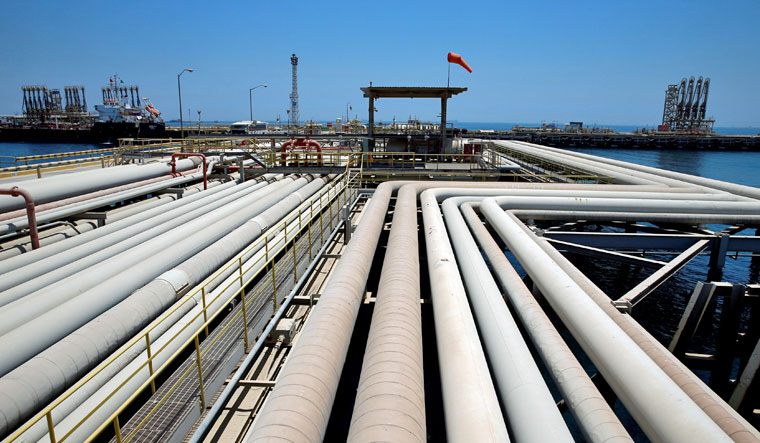Oil prices surged the highest since the 1991 Gulf War, after drone attacks on two Saudi oil facilities halved output in the world's top crude exporter, fuelling fresh geopolitical and growth fears.
In the aftermath of the attack, US President Donald Trump declared that it "looked" like Iran was behind the explosive attack. But, he stressed that military retaliation was not yet on the table in response to the strike against a key US middle-east ally.
The new violence has led to fears that further action on any side could rapidly escalate a confrontation that's been raging just below the surface in the wider Persian Gulf in recent months.
ALSO READ
- Centre hikes windfall profit tax on crude oil, cuts levy on diesel exports
- Consolidation continues in US oil industry; Chevron acquires Hess Corp. for $53 billion
- India's import of Russian oil hits record high in May
- 'Not looking to sanction India:' US says it is comfortable with India buying Russian oil
- OPEC keeps oil targets amid uncertainty on Russian sanctions
- Explained: What's the effect of Russian oil price cap
- Oil’s triple whammy—economic, strategic and political—does not augur well for India and world
- 'India will buy oil from wherever it has to': Union Minister Puri
- Jaishankar meets Blinken, raises oil price, visa backlog issues
- Why shares of oil refiners and producers plunged on Friday?
There already have been mysterious attacks on oil tankers that Washington blames on Tehran, at least one suspected Israeli strike on Shiite forces in Iraq, and the downing of a US military surveillance drone by Iran.
Those tensions have increased ever since Trump pulled the US out of Iran's 2015 agreement with world powers that curtailed Iranian nuclear activities and the US re-imposed sanctions that sent Iran's economy into freefall.
Europe's benchmark Brent Crude surged by 20 percent and US counterpart WTI by 15 percent as commodities trading got underway after Trump warned that the US was "locked and loaded" to respond to the attacks that Washington blamed on Iran.
Both contracts later came off their peaks, but were still up around 12 percent at the close of European trading.
The price surges weighed across world stock markets on fears that a sustained higher cost of crude could impact already weakening global economic growth.
"Growing tensions in the Middle East are another headwind for the global economy in already uncertain times and a full-blown conflict could trigger another leg in the global downturn," said Jennifer McKeown, head of Global Economics at Capital Economics.
However, share prices of energy majors jumped, with traders seeing higher profits down the line for the likes of BP and Shell.
The weapons used to strike Saudi oil facilities were Iranian-made, the Riyadh-led coalition said Monday.
Saudi's energy infrastructure has been hit before, but this strike was of a different order, abruptly halting 5.7 million barrels per day (bpd) or about six percent of the world's oil supply.
The Saudi-led coalition, which is bogged down in a five-year war in neighbouring Yemen, reiterated the assessment that the Huthis were not behind it, pointing the finger at Iran for providing the weapons.
Russia urged "all countries to avoid hasty steps or conclusions that could exacerbate the situation" while the European Union stressed all sides should show "maximum restraint".
In foreign exchange, the dollar was down against the yen and up against the euro, while the pound slid, with the EU saying that Britain had offered no new, viable Brexit proposals after Prime Minister Boris Johnson held Brexit deal talks with EU chief Jean-Claude Juncker.
Gold, which along with the yen is seen as a haven in times of geopolitical and economic unrest, rose.
Markets' focus was firmly on oil however after the weekend attack that was claimed by Tehran-backed Huthi rebels in neighbouring Yemen, where a Saudi-led coalition is bogged down in a five-year war.
"Oil price shocks like this are bad news for growth," Neil Wilson, chief market analyst at trading group Markets.com, told AFP.
"It raises stagflation risks too—higher oil prices suppress growth and raise inflation. Of course it depends how long this lasts, does the risk-premium mean higher prices for the rest of the year or does it fade quickly if it comes back on stream this week?"
Saudi Arabia was on Monday expected to restore at least a third of the production lost to the attacks, according to experts and reports.
The Saturday strikes on national energy giant Aramco's Abqaiq processing plant and Khurais oil field knocked 5.7 million barrels per day off production, more than half of the OPEC kingpin's output.
Saudi Energy Minister Prince Abdulaziz bin Salman on Sunday said the kingdom would use its vast inventories to partially compensate for the lost production and the US also authorised the release of its reserves.
"The attack wiped out around half of Saudi Arabia's production—representing around five percent of global daily output—and highlighted the vulnerability of security at these facilities to drone attacks," noted Oanda senior market analyst Craig Erlam.
"Spikes in oil prices when the global economy is already flirting with the idea of recession is not ideal and, if repeated and sustained, could ultimately be what tips us over the edge," he added.
Facing a dauntingly uncertain economic horizon amid the US-China trade war, the Federal Reserve is set to cut interest rates this coming week, analysts predicted.
-Inputs from PTI


